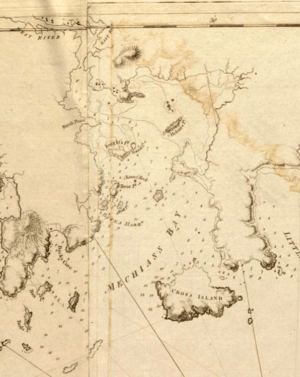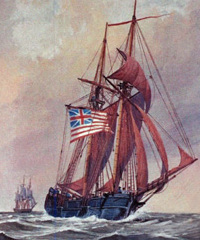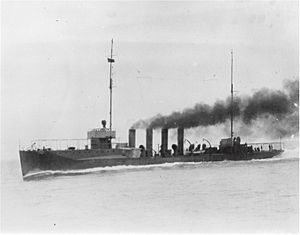Battle of Machias facts for kids
Quick facts for kids Battle of Machias (1775) |
|||||||
|---|---|---|---|---|---|---|---|
| Part of the American Revolutionary War | |||||||
 A 1776 nautical chart of Machias Bay; Machias is at the very top |
|||||||
|
|||||||
| Belligerents | |||||||
| Commanders and leaders | |||||||
|
|
|||||||
| Strength | |||||||
| schooner HMS Margaretta about 40 Royal Navy seamen |
Private sloops Unity and Falmouth Packet 55 Massachusetts militia |
||||||
| Casualties and losses | |||||||
| 5 killed 9 wounded |
10 killed 3 wounded |
||||||
The Battle of Machias was an early naval fight during the American Revolutionary War. It happened on June 11–12, 1775, near the port of Machias, Maine. This battle is also known as the Battle of the Margaretta.
After the war began, British leaders needed supplies for their soldiers. These soldiers were stuck in Boston during the Siege of Boston. A merchant named Ichabod Jones, who supported the British, was hired to bring supplies to Machias. He arrived with two of his own ships and a British armed ship called HMS Margaretta. Midshipman James Moore commanded the Margaretta.
The people of Machias did not like Jones's plans. They arrested him. They also tried to arrest Moore, but he got away to his ship. The townspeople then took one of Jones's ships and armed it. They also armed another local ship. They sailed out to fight Moore. After a short battle, Moore was badly hurt, and his ship and crew were captured.
The people of Machias later captured more British ships. They even fought off a large British attack in 1777. Ships from Machias, including privateers (private ships allowed to attack enemy ships), kept bothering the British Navy throughout the war.
Contents
Why the Battle Happened
The American Revolutionary War started on April 19, 1775, with the Battles of Lexington and Concord. After these battles, American forces surrounded the British army in Boston. This was called the Siege of Boston.
British leaders in Boston, General Thomas Gage and Admiral Samuel Graves, needed help. Gage needed wood to build shelters for his soldiers. Graves wanted to get cannons from a shipwrecked British ship, HMS Halifax. This ship had been purposely run aground in Machias Bay in February 1775. American Patriots in Machias were interested in these cannons.
Admiral Graves allowed Ichabod Jones, a merchant from Machias, to bring food to Machias. In return, Jones would bring back the wood Gage needed. To make sure this trade happened, Graves sent Midshipman James Moore. Moore commanded the armed ship HMS Margaretta and went with Jones's two merchant ships, Unity and Polly. Moore also had orders to try and get anything useful from the Halifax shipwreck.
Arrival in Machias
On June 2, 1775, Jones's ships reached Machias. But the townspeople were not happy. Jones refused to sell his food unless he could load wood for Boston. On June 6, the townspeople voted against trading with Jones.
Because of this, Jones told Moore to move the Margaretta closer to town, ready to fire. This threat made the townspeople vote again. This time, they agreed to allow the trade. The ship Unity was docked to start unloading supplies.
After the vote, Jones said he would only trade with those who voted for it. This made many people angry. Colonel Benjamin Foster, a local militia leader, then planned to capture Jones. He got help from militia members in nearby towns. Foster planned to grab Jones at church on June 11. But Jones saw the men coming and escaped into the woods. Moore managed to get back to his ship. Jones stayed hidden for two days.
The next day, the men of Machias gathered again. Foster took about 20 men, including his brother, Wooden Foster, to East Machias. There, they took over the Unity. They built wooden walls on its deck for protection. They also took another local ship called Falmouth Packet.
Other militia members went by land to find where the Margaretta was anchored. They demanded that Moore surrender. Moore refused. He sailed to where the Polly was anchored and tried to get it back. There was some shooting between Moore's ship and the militia on shore, but no one was hurt. Moore then raised anchor and moved to a safer spot. The remaining Machias men armed themselves with guns, pitchforks, and axes. They set out to chase the Margaretta.
The Fight Begins
After escaping the Machias men, the Margaretta had trouble sailing. Strong winds broke its main boom and gaff (parts of the mast and sail). This made it hard to steer. Moore then captured another small ship in Holmes Bay. He took its spar and gaff to fix the Margaretta. He also took the other ship's pilot, Robert Avery, as a prisoner.
The crew of the Unity, about 30 Machias men, chose Jeremiah O'Brien as their captain. They sailed out to chase the Margaretta. The Unity was a much faster ship. O'Brien's crew quickly caught up to the damaged Margaretta. The Falmouth Packet was slower and fell behind.
When Moore saw the Unity getting close, he tried to escape by setting all sails and cutting away his small boats. As the Unity got closer, Moore started firing. The Unity crew avoided damage and pulled their ship next to the Margaretta. Led by Joseph Getchell and O'Brien's brother, John, the Unity crew stormed aboard. Both sides fired muskets. Moore threw hand grenades onto the Unity. Moore was shot in the chest by Samuel Watts.
Once the Falmouth Packet caught up, it pulled alongside the other side of Moore's ship. With both crews attacking, they quickly took over the Margaretta.
After the Battle
Moore was very badly hurt in the battle. His second-in-command, Midshipman Richard Stillingfleet, surrendered the ship and crew. Moore was taken back to Machias. He was cared for by Ichabod Jones's nephew, Stephen Jones. But Moore's injuries were too severe, and he died the next day. Three other British crew members were killed, including Robert Avery. The rest of the British crew were held in Machias for a month. Then, they were given to the Massachusetts Provincial Congress. Some reports said that as many as 100 British men died, but this was likely an exaggeration. Machias lost two men, John McNiell and James Coolbroth. Three others were badly wounded.
The people of Machias expected the British to attack back. They immediately asked the Massachusetts Provincial Congress for help and supplies. The Provincial Congress helped Machias prepare its defenses.
Jeremiah O'Brien quickly added wooden walls to one of the captured ships. He armed it with guns and swivel guns taken from the Margaretta. He renamed this ship Machias Liberty. In July 1775, O'Brien and Benjamin Foster captured two more British armed ships, Diligent and Tatamagouche. The officers of these ships were captured when they came ashore.
In August 1775, the Provincial Congress officially recognized O'Brien and Foster's actions. They made both Machias Liberty and Diligent part of the Massachusetts Navy. O'Brien was made their commander. The British did not attack Machias again until October 18, 1775, when they attacked another town in Maine in the Burning of Falmouth.
Later, in 1777, a small British fleet tried to take Machias in the Battle of Machias (1777). This battle happened on August 13–14, 1777. The local people, with help from their Native American allies, successfully fought off the British.
During the war, men from Machias fixed up and armed many ships, including the Margaretta. They sailed out to fight the British. The Machias Liberty and Diligent were used to stop merchant ships that were supplying the British in Boston. Jeremiah O'Brien and John Lambert built a new ship with twenty guns. They became privateers, meaning they had permission from the American government to attack enemy ships. Both men later joined the Continental Navy. O'Brien was captured in late 1777 but escaped from a British prison. He continued to be a privateer throughout the war.
The British Navy was very annoyed that Machias was used as a base for attacks in Nova Scotia. Admiral Samuel Graves ordered Sir George Collier to destroy Machias in 1777. Graves tried many times to take control of Machias, but he never succeeded.
Images for kids
 | James B. Knighten |
 | Azellia White |
 | Willa Brown |




